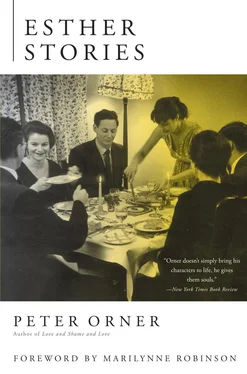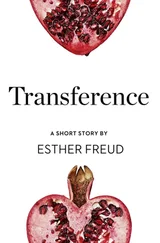But then her driving became something more, and she drove west, away from Iron River, loving the car and the new blacktop on the two-lane to Poplar. No one on the road that early except for a few trucks. The tall pines of the Brule River State Forest on both sides, towering over the highway. Trees that meant home. The muddy trails that wound through them. The thousand deer. She kept going west and drove all the way to Route B, which circled around Lake Nebagamon, that quiet lake where she and Wade went once in a while to get away from Hulbert. The little beach with the raft. NO LIFEGUARD ON DUTY, SWIM AT YOUR OWN RISK. A sign they liked. They always did their best to lie on the beach and avoid watching the children splashing — refused to tell any of them not to push each other off the raft. She drove with her head out the window, wind gusting in her face, sometimes seeing glimpses of the lake through the damp green trees, sometimes not. Near the bait shop she got out and walked to the end of the dock and dangled her feet in the waveless water. A man was swimming across the small cove by the bridge, and she watched his slowly arcing arms. She thought of Wade stomping down the highway and his anger and how he wasn’t going to get it and how she was going to have to explain it to him. When she got home, her mother and stepfather were both already at work. A note from her mother was waiting for her on the kitchen table pad. Her mother’s looping, forgiving handwriting. She didn’t read it.
MRS. GOLD down the block in the colossal brick house tried to off her husband, a huge Cadillac-driving guy named Jerry, by hiring two hit men from Bolingbrook to murder him in the shower. Turned out one of the guys was an undercover Chicago cop specializing in spousal homicide. Later, in prison, Mrs. Gold fell in love with the lawyer working on her appeal, my mom’s friend, the formerly unassuming and mousy Fran Swanner. This all happened in Morton Grove, Illinois, in 1981. There’s more. When they sent her down to Five Hills Correctional in Centralia, Mrs. Gold was pregnant with the baby of one of the hit men, the real hit man, the one who wasn’t a cop. Mrs. Gold was sentenced to six years, and for the first two, the baby, Theodore, lived with his mother at Five Hills. Then, on his second birthday, he moved into Fran Swanner’s house on Cedar Valley Road. When Mrs. Gold got paroled a year later, she joined them.
Of course if only it had been that easy. Fran Swanner was married when she and Mrs. Gold fell hard for each other. To a courtly real estate agent named Don, and they had two very bright kids, twins. I think Jeremy ended up at Harvard, Lisa at Johns Hopkins. Or maybe it was the other way around. Anyway, that was after. Fran and Don’s kids were seniors in high school when all this started. Fran had just served them plates of fried fishsticks and hash browns. Don was still at work. “Kids,” she announced, “I’m divorcing your father and intend to live with Lena Gold — whom I love — as soon as she is released from prison, where she is being wrongly held. As soon as my writ of habeas corpus is approved by the Third District of the Appeals Court of the State of Illinois on the grounds of unconstitutional government entrapment…” There was a little Get out of here with your law stories, Mom, until they realized her earnest legal babble was dead serious. After this, there was a lot of shrieking and door slamming. What-the-hell’s-gotten-into-you sort of stuff. But what was done was done. Their mother’s voice didn’t crack and she was matter-of-fact. “This is non-negotiable, but remember, I will always be your mother and your father will always be your father.” Then Lisa and Jeremy took off in Fran’s car, and she remained at the kitchen table with folded hands and waited for Don to return home. He took it better. Don endured the news, as he did every other setback in his life, with a baffled shrug. Fran, although shy, had always been unpredictable in small ways, particularly when it came to sex. He’d spent much of his adult life charting her desires, trying to keep up with her. In 1974 they bought a water bed. In the spring of ’79 they attended a conference, called “Orgies for the Happily Married,” in Scottsdale, Arizona. The year before, the Rosenkrantzes, Glo and Simon, had spent an interminable Memorial Day holiday in Fran and Don’s bedroom. This, of course, was bigger and was going to ruin his life, but what could he say? Our house? Our family? Fran wasn’t a cold woman, and in twenty years of marriage she’d never lied to him. She had always been steadfast in her love. Now her love had changed focus, dramatically. “I ache for her, Don. It hurts. I’ll say that much. It hurts me not to be there with her this very second.” Two days later, Don and Jeremy and Lisa moved into a rented apartment above Don’s Century 21 office on Simonian. He accepted a generous cash settlement as well as a half life interest in the house, split between him and the kids. Fran also contracted to pay both Jeremy and Lisa’s twenty-thousand-plus tuitions.
My mom told me most of this. Not about the murder plot itself. That part was in the Chicago Sun-Times for three days running. She told me the rest, though. She was in on all that. Nothing shocks my mother. When Fran Swanner told her that she’d fallen fast and hard for one of her clients, the infamous bouffant-haired husband-killer Lena Gold, and that she was divorcing Don and he was taking the kids — and that she was going to help raise Mrs. Gold and the hit man’s child — I can see my mom waving away, for the moment, the complications and giving Fran one of her smothering hugs and sloppy lipstick smooches and gushing, “Oh, honey. I’m absolutely thrilled you’re in love!”
I played a cameo role in the saga. I was Theodore’s babysitter after he moved in with Fran. Theodore was a pretty normal kid, considering. A sweet kid who was always handing me presents like half-eaten strawberries. He was also quiet. He never cried while I watched TV. He was mostly content simply to play with his mother’s old shoes. Best of all was that I got ten dollars an hour, which was six dollars more than the going rate in those years. And after she got paroled, Mrs. Gold always tipped me another five when Fran wasn’t looking. Then she’d speak to me in a raspy whisper I have forever associated with the way women talk in prison. “Little Beth,” she’d say, even though I was nearly as tall as she was, “go nuts with the extra.” I always got the feeling that Mrs. Gold tipped me more for not being afraid and not passing judgment than for anything I ever did for Theodore. Whatever the reasons, having Lena Gold’s money in my pocket made my neck sweat. I’d get pricked by the power of it passing into my hand from her long, spidery fingers. As though now I had license to do something dramatic, like break someone’s car windows on the way home. Or better, let my gym teacher — Mr. Carl — see me naked in his shoebox office, with the door locked. Because I knew how much he ached for that.
And even after she got out of prison, Lena Gold still had all that big white hair. It looked the same as it did when I was ten and would see her squatting in her front garden. In hind-sight, I know she was probably masterminding her plan to get rid of Big Jerry, right there among her impatiens and petunias. But if anyone deserved it, he did. Jerry Gold was a loud, crashing guy. A wildebeest in a Cadillac, as wide as his whale of a car, a Coupe DeVille with doors the size of Toyotas. He used to drive 85 down Paulina Street. I’d be riding my bike around no-handed on a Saturday and Jerry would come barreling my way, jamming his horn, a suburban Ahab roaring out his sunroof, “SIDEWALK! SIDEWALK!” I don’t think there was anyone in our neighborhood, including the forever cloistered Mrs. Newton Rimwaller (whom my brother swears he actually saw once in the fall of ’79), who was very sad to hear that Lena Gold had hired two guys to dress up as house painters and assassinate him while he sang and farted in the shower. I know a lot of us were sorry she’d failed so embarrassingly.
Читать дальше












